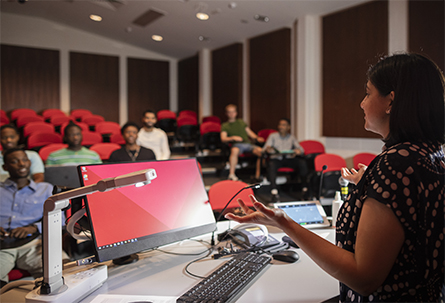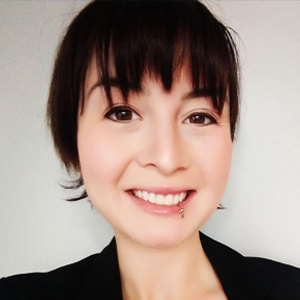‘If I don’t, who will?’
Notes from the authors
A matter of consequence
To write or not to write. That was the question I asked myself a hundred times as I contemplated writing this essay.
If I were to write an essay about uncompensated labor, I knew I would have to discuss certain things. I knew what those things were, how to write about them and what I wanted to say. The problem was: What would be the ramifications of bringing those things up?
For example, as a person of many privileges, would I come across as a complainer, especially when my burdens are not nearly as heavy as those of my Black and brown colleagues?
If I brought up the mental and emotional burden of mentoring students — not just on the expected things like getting into grad school and finding a job but on the more personal challenges like dealing with anxiety, depression, loss and feelings of inadequacy and lack of belonging — would students stop asking me for help? Would they pause before coming to me with their problems and ask themselves, “Should I really burden Dr. Michel with this when she clearly has so much other stuff on her plate?”
I would hate for an essay that’s supposed to be helpful to end up being hurtful.
And then I realized that, although this is a personal essay, it’s not just about me. It’s about all of the faculty members, especially women and people of color, who take on uncompensated labor every single day and whose careers often are stymied and sometimes ended by these extra burdens.
So, here goes …
— Lea Michel
A house of cards
Every morning, as I get ready for the 30-minute drive to campus, I finish putting together my house-of-cards schedule.
I know better, yet I continue to plan out my day with no margin of error, scheduling meetings back to back, sometimes finding 15-minute holes and then immediately filling those holes with tasks that are due (or, let’s be honest, overdue).
This may sound familiar to all of us in academia. However, it is important to note that all of our overfilled schedules are not created equally.
How many search committees do we say yes to because we know we may be the only ones in the room to represent a perspective shaped by social constructs and systemic oppression? How many hours do we allocate to mentoring students who often seek us out because we represent identities that are scarce in academia? How many panels, talks and invited speaking events do we attend for free because we worry about the consequences of the audience not hearing what we have to say (or, even more troubling, because we believe we don’t deserve that compensation).
How many times do our house-of-cards schedules get toppled because a student comes to our office in tears over something deeply personal and traumatic and we know we have to stop everything to get them the help they need?
When this opportunity was presented by Dr. Michel to collaborate on an essay regarding the problematic yet seemingly too common phenomenon of invisible/uncompensated labor, I jumped at the chance.
While the mere act of writing this essay could be counted as another act of uncompensated labor, I was excited to collaborate with another colleague who gets it and have room to discuss both our own experiences and what changes could be made in academia to address this burden.
Here are our thoughts …
— Desirée Forsythe
The problem as we see it — and a few solutions
For the past decade, we’ve been told that diverse teams are more productive, creative and higher achieving than homogenous teams.

On its face, this makes sense. Diverse teams bring in diverse experiences, creating a wider variety of ideas and solutions that will work for a larger number of people. Historically, we can point to many institutions (say, the United States government) wherein an overrepresentation of a few led to policies and practices that harmed many.
However, the problem with diverse teams comes when the pool you’re working with isn’t all that diverse in the first place, so the one person of color (feel free to insert any other marginalized identities here) is asked to serve on every committee. And while some committees are prestigious and may even get you face time with the VIPs, most committee work is arduous, time-consuming and — let’s just say it — should have been an email.
But here is the hard part: What’s the alternative? Having homogenous committees that lack the perspective of a more diverse faculty?
For certain committees — such as tenure committees, faculty search committees, faculty affairs groups and academic senates — that is unacceptable, and every attempt should be made to make those committees as diverse as possible.
But for many other committees, yes, that’s a price we’re going to have to pay until we have a larger, more diverse pool of faculty.
In other words, if you don’t have a diverse faculty (and hopefully you’re working on getting one!), you can’t expect a small minority of people with marginalized identities to serve on all of the committees. It’s unrealistic and often detrimental to their careers (see below).
Instead, nominate them for committees that will help them with their careers and/or have the most impact on the university, such as committees that provide leadership opportunities, those in charge of selecting the future faculty, and those that write or vote on policies and procedures.
It is also important to note that the university itself has a responsibility to support its diverse faculty members who already are employed and to promote initiatives that will improve the culture of inclusion.
For example, faculty members should be compensated if they go above and beyond what is expected. If a faculty member who is already doing a ton of service is needed to serve on a time-consuming committee (a search committee, for example), then see how you can lighten their load in other areas (for example, by hiring a grad student to help them with grading or giving them the class section with fewer students or with the more accommodating schedule).

Additionally, in spaces that are not diverse, the university should hire outside consultants to help address both the lack of diversity within the institution and to design and implement practices to address places of systemic oppression on campus.
Of course, while service and committee work is incredibly important, students are really the bread and butter of our universities and often the focus of much of our attention. And while the student population is changing (more than 44% of the college population is nonwhite, and women earn 57% of bachelor’s degrees), the makeup of the faculty hasn’t caught up. Women and people of color are still underrepresented in the academy, especially in STEM fields.
So what does this mean? Taking this back to uncompensated labor, it means there’s a mismatch of students and faculty members.
There are fewer role models that students of color can see themselves in. There are fewer mentors that students with minoritized identities of sexuality and gender can feel safe working with. And there are fewer faculty who know the resources and ways to help students with disabilities. This mismatch places a larger burden of student mentoring on those faculty with whom the students can relate.
Do white men make excellent role models and fantastic mentors? Yes, of course. But when a student is looking for a faculty member to confide in, to share their emotional burdens with, and to ask for personal advice and guidance, they often find faculty members with whom they can identify or who can (at least from their perspective) understand where they’re coming from.

That’s why women, faculty of color and those with other marginalized identities tend to spend more time mentoring and meeting with students than their colleagues.
It is important to note not only the amount of time that goes into this type of mentoring but also the emotional toll that it takes.
Many of us are wading through our own daily identity-related aggressions, processing our own trauma and attempting to survive in a world that was not constructed with us in mind.
While many of us always felt that this was a heavy load to carry, the amount of psychological and physical distress that we see in our students recently has been amplified, given the COVID-19 pandemic and society’s overdue awakening to systemic racism.
The students we support are immensely important to us, and we ask ourselves: “If I don’t, who will?”
Not only is this uncompensated labor unequally relegated to women and people of color, but the long-term effects on these faculty members can be quite serious.
These faculty members spend extra time on mentoring students and serving on panels (women and faculty of color often are asked to be on panels in order to round out the otherwise white, male group) and committees (especially those related to diversity, equity and inclusion efforts at universities). Meanwhile, their colleagues spend that time on research efforts that more directly lead to increased productivity and other promotable endeavors.
Overcoming these challenges won’t be easy, and there are many systemic barriers that must be toppled before real change can be made.
But first and foremost, it is important to become aware of the unfair burden that women, people of color and others with marginalized identities share when it comes to uncompensated labor.
While recognition by those who hold positions of power within the academy is a first step in a much-needed journey toward equity, additional steps must be taken to ensure the health and success of diverse peoples within academia.
Small but significant changes — like prioritizing important/high-impact committee work and outsourcing or hiring experts in the DEI field to support the school in DEI efforts — can make big differences in faculty satisfaction and retention.
Enjoy reading ASBMB Today?
Become a member to receive the print edition four times a year and the digital edition monthly.
Learn moreGet the latest from ASBMB Today
Enter your email address, and we’ll send you a weekly email with recent articles, interviews and more.
Latest in Opinions
Opinions highlights or most popular articles

Women’s health cannot leave rare diseases behind
A physician living with lymphangioleiomyomatosis and a basic scientist explain why patient-driven, trial-ready research is essential to turning momentum into meaningful progress.

Making my spicy brain work for me
Researcher Reid Blanchett reflects on her journey navigating mental health struggles through graduate school. She found a new path in bioinformatics, proving that science can be flexible, forgiving and full of second chances.

The tortoise wins: How slowing down saved my Ph.D.
Graduate student Amy Bounds reflects on how slowing down in the lab not only improved her relationship with work but also made her a more productive scientist.

How pediatric cataracts shaped my scientific journey
Undergraduate student Grace Jones shares how she transformed her childhood cataract diagnosis into a scientific purpose. She explores how biochemistry can bring a clearer vision to others, and how personal history can shape discovery.

Debugging my code and teaching with ChatGPT
AI tools like ChatGPT have changed the way an assistant professor teaches and does research. But, he asserts that real growth still comes from struggle, and educators must help students use AI wisely — as scaffolds, not shortcuts.

AI in the lab: The power of smarter questions
An assistant professor discusses AI's evolution from a buzzword to a trusted research partner. It helps streamline reviews, troubleshoot code, save time and spark ideas, but its success relies on combining AI with expertise and critical thinking.


